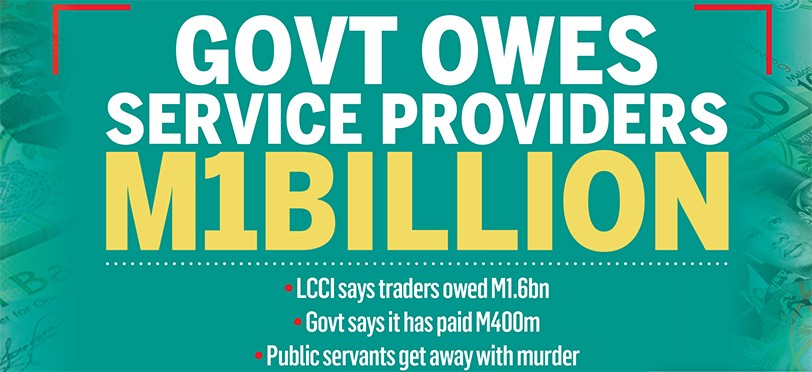By ‘Majirata Latela
- LCCI says traders owed M1.6bn
- Govt says it has paid M400m
- Public servants get away with murder
The ministry of finance has admitted that the government owes Basotho service providers in excess of M1billion in unpaid bills. However, M500million has already reportedly been sourced to pay off the debt.
According to World Bank reports Lesotho’s Public debt remains on an upward trajectory. The fiscal deficit is expected to narrow to 3.3 percent of Gross Domestic Product (GDP) in 2020-21. Public debt is expected to increase to 52.7 percent and 53.1 percent in 2020 and 2021, respectively, mainly driven by government investment projects.
GDP is the monetary value of all the finished goods and services produced within a country’s borders in a specific time period and include anything produced by the country’s citizens and foreigners within its borders. It is primarily used to assess the health of a country’s economy.
GDP is one of the most common indicators used to track the health of a nation’s economy. The calculation of a country’s GDP takes into consideration a number of different factors about that country’s economy, including its consumption and investment.
Public debt is estimated to have reached 49.7 percent of GDP in 2019, and the overall risk of debt distress remained moderate in the 2019 debt sustainability analysis (DSA).
Lesotho recorded a government debt equivalent to 40.90 percent of the country’s Gross Domestic Product in 2018.
Government debt to GDP in Lesotho averaged 51.93 percent from 1990 until 2018, reaching an all-time high of 88.66 percent in 1990 and a record low of 35.60 percent in 2017.
There has been a growing outcry from Basotho business people in recent years, over government’s failure, or perpetual delay, to pay them for goods and services rendered.
Lesotho currently has a list of people who were known to be big business players in the tendering process who currently do not own even a two-roomed house; more often than not people would label such a person as a corrupt or careless businessman.
This publication approached the Lesotho Chamber of Commerce (LCCI) to establish the extent and impact of government’s non-payment of Basotho service providers, and it emerged that the debt has now gone up to M1.6billion from M600miilion in 2016-2017.
LCCI’s Technical Committee Member responsible for recovering outstanding government payments, Nthako Sekome, has told theReporter that they have been grappling with this issue since August 2019 to prevent Basotho businesses from dying.
“LCCI as a supporter of all businesses, decided that if its members are complaining about non-payment, it means the entire business sector is in danger of extinction and something needs to be done to rescue the situation.
“We then formed a technical team which would engage all relevant stakeholders about the matter, regardless of whether they are creditors affiliated to LCCI or not.
“According to our records, M1.6billion is the highest amount that government has ever owed businesses. We are worried that instead of going down, the debt keeps accumulating. Government enjoys the services that the private sector offers but fails to pay us with the same smile,” Sekome quipped.
Sekome told this publication that they engaged different ministries on the issue but these were not cooperative at all until, they sought the intervention of then finance minister Dr Moeketsi Majoro who was more accommodating.
The discussions promised to bear fruit as in October last year, as Majoro told them that a sum of M1.4billion had been sourced to pay the debts.
“Unfortunately, the change in governments saw Dr Majoro becoming Prime Minister and there is a new finance minister who we will have to brief on the matter so he continues where the last minister left off.
“The problem that we noticed is that most officers in the ministries hide behind the ministry of finance, in that they do not pay their debts with the budget that they are allocated each year and instead choose to send us on a wild goose chase with their empty promises.
“At the moment, what we want to know is what happened to the sourced amount of money and if there were people, who were paid, how many were paid, and the procedure of payment,” he said.
LCCI further claimed that it is aware that there are people among the creditors (who are owed M1.6billion) who were involved in underhand dealings to score tenders. LCCI will fight for such people to get paid.
Sekome is adamant that, even though LCCI may not fight for those rogue businesses people, they would still need to be investigated because most of the time corruption starts from the officials who are never held to account for their actions. He regretted that public officers are never fired or prosecuted for their involvement in corrupt dealings while businesses face the music alone; they either don’t get paid or have their assets frozen and confiscated.
“Public officers get involved in corrupt practices all the time but more often than not they just get suspended with full pay and, after a few months, they are reinstated through court orders and continue with their corrupt ways while their cases drag on in court.
“The ultimate loser is the businessman. Our business die while government sleeps on the job and leaving people to break the law at will without facing the consequences of their actions. Yet when business person gets accused of conducting business in a dodgy manner, they never get paid; or in the worst case scenario, they get blacklisted,” Sekome charged.
He added that the danger of government’s non-payment is that some business people end up dying from stress or depression. After winning a tenders, most service providers seek bank loans to finance the work, in the process using their assets as collateral security, and government’s non-payment places them at risk of losing everything.
Lesotho Hotels and Hospitality Association chairperson, ‘Marethabile Sekhiba, confirms government owes members a lot of money which has been building up over the years and threatening the survival of their businesses.
“The money that the government owes us amounts to millions of Maloti. I just don’t have the exact figure now, but the hotels and guesthouses have unhonoured invoices that date back to 2015.
“This affects our businesses very negatively; we cannot meet some of our obligations such as salaries, taxes and loans.
“Also, the government is the biggest customer and we cannot just stop rendering services to it even though it kills our businesses. The money comes handy when it is eventually paid. We plead with the government to pay us on time so that we save our businesses,” Sekiba said.
For her part, Account General ‘Malehloholo Mahase admits that government does indeed owe the business community M1billion, not M1.6billion as claimed by LCCI.
“M400million of the outstanding debt has already been paid, which means the debt now stands at M600miilion.
“When the lockdown approached we arranged with the ministries to use the money they would save during the hiatus to pay off some of the arrears that they had; as we speak, ministries are still coming to us to ask for permission to divert the monies.
“The M400million that we used to pay creditors is from the M500million that we sourced internally from the Central Bank treasury bills and bonds. We are also going to use funds from this year’s budget to pay other arrears because there was no money sourced from external sources.
“We are still paying people and we will keep on processing their payments until all Basotho businesses have been paid. We are sorry for the delays, but we plead with everyone to be patient while we do the best we can to fast-track payments,” Mahase said.









